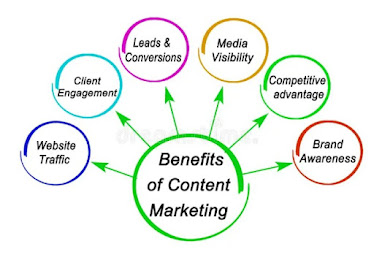What are the benefits of content marketing?
Content marketing has become an indispensable strategy for businesses and marketers in the digital age. It involves creating and distributing valuable, relevant, and consistent content to attract and engage a target audience. When executed effectively, content marketing offers numerous benefits that can significantly contribute to a company's success. Below are some of the key advantages of content marketing:
1.
Increased Brand Awareness: Consistently
producing high-quality content allows businesses to cabinet their expertise and
knowledge in their respective industries. As more people come across this
valuable content over various channels, such as social media, search engines,
and email, brand visibility and recognition grow. This heightened awareness can
lead to increased trust and credibility among potential customers.
2.
Improved Search Engine Rankings: Content plays a
vital role in search engine optimization (SEO). Search engines like Google errand
websites that regularly publish valuable and relevant content. By optimizing
content with relevant keywords and earning backlinks, businesses can recover
their search engine rankings, making it easier for potential customers to find them.
3.
Lead Generation and Nurturing: Content marketing
is an real tool for generating leads and converting them into customers. By making
content that addresses the pain points and wants of their board audience,
businesses can attract potential customers who are already attentive in their
products or services. Moreover, content can be used to nurture leads through
the sales funnel, providing valuable information and building trust until
prospects are ready to make a purchase.
4.
Cost-Effectiveness: Compared to traditional
advertising, content marketing is generally more cost-effective. While it needs
an investment of time and resources upfront, once the content is created and
published, it can last to attract and engage audiences for an extended period
without incurring additional costs.
5.
Establishing Thought Leadership: Consistently
producing authoritative and valuable content can position a business as a
thought leader in its industry. This can lead to increased respect, trust, and
influence within the target market. Thought leadership can also open doors to
speaking engagements, media opportunities, and partnerships.
6.
Building Customer Loyalty: Content marketing is
not just about acquiring new customers; it's also about nurturing existing
ones. By providing ongoing value through informative and entertaining content,
businesses can strengthen their relationships with customers, leading to
increased loyalty and advocacy.
7.
Versatility and Reach: Content marketing allows
businesses to experiment with various formats, such as blog posts, videos,
infographics, podcasts, and more. This versatility enables companies to reach
diverse audiences, catering to different preferences and learning styles.
8.
Social Media Engagement: Compelling and
shareable content is an essential driver of social media engagement. When
audiences find content valuable and relevant, they are more likely to share it
with their networks, amplifying the reach and potential impact of the content.
9.
Data Collection and Insights: Content marketing
provides an opportunity to gather valuable data on audience behavior,
preferences, and interests. By analyzing how audiences interact with content,
businesses can gain insights that inform future marketing strategies and
product/service improvements.
10.
Long-Term Benefits: Unlike some forms of
advertising that have short lifespans, evergreen content can continue to
attract and engage audiences for an extended period. This long-term approach
can yield ongoing benefits and a higher return on investment over time.
What is quality digital content?
Quality digital content is content that is valuable,
relevant, and engaging to the goal audience while meeting specific objectives
set by the creator. In today's digital age, where information is abundant,
creating high-quality content is crucial for businesses, organizations, and
individuals to stand out and effectively connect with their audiences. Here are
some essential characteristics of quality digital content:
·
Relevance: Quality digital content must be
tailored to the interests, wants, and preferences of the target audience. It
should address specific pain points, answer questions, or provide solutions
that resonate with the intended viewers or readers.
·
Value: Valuable content goes beyond
surface-level information and offers in-depth insights or actionable takeaways.
Whether it's educational, entertaining, or inspiring, quality content provides
something meaningful to the audience, leaving them with a sense of enrichment
after engaging with it.
·
Accuracy and Credibility: Trust is paramount in
the digital space, and quality content is accurate, reliable, and supported by
credible sources when appropriate. Providing verifiable information enhances
the credibility of the content creator and fosters trust among the audience.
·
Originality: Standout digital content is
original and unique. It brings fresh perspectives, innovative ideas, or a
creative approach to a topic, differentiating it from generic or duplicated
content found elsewhere on the internet.
·
Clarity and Coherence: Quality content is
well-structured, easy to understand, and flows logically from one point to
another. Whether it's a blog post, video, infographic, or podcast, content
creators should aim for clarity and coherence in presenting their ideas.
